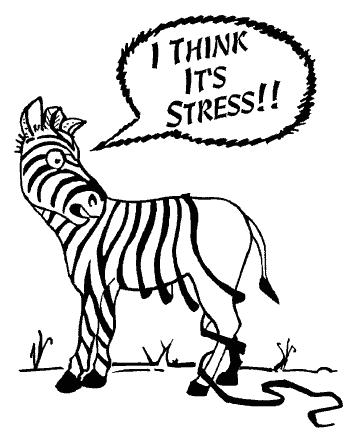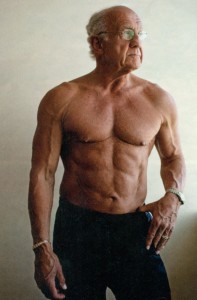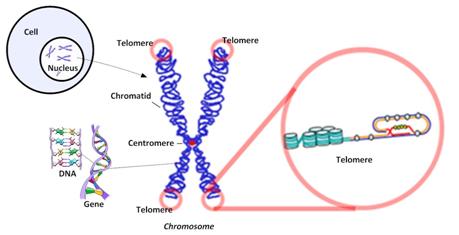Why Chronic Stress Is The Biggest Super Ager Of Them All

Yes, stress is a super ager, but it’s manageable and the benefits of doing so are huge. Watch SciShow’s Hank Green present some details, and Physicist Michio Kaku dive into how stress messes with genetics.
 MY OPEN secret is that I’m very focused on life extension, as in mine — and thru many of the topics here explored on this site, yours.
MY OPEN secret is that I’m very focused on life extension, as in mine — and thru many of the topics here explored on this site, yours.
Over the years, the stuff I’ve been doing seems to be working, and this has not gone unnoticed.
Now, when I do a detox cleanse, my buds clamor to jump aboard. When people are visiting and they see me reach for the supplement box, they want to know about my latest protocol. And, they wonder, why a once-committed gym rat now rarely enters one; or why I now stress mobility rather than heavy weightlifting exercises.
(I have nothing against gyms, just wanted to test what’s possible without one.)
Another open secret is that I intend to finally focus this blog on health matters related to living a long and strong life.
After all, that’s what I’m doing, day in, day out… step by step, I’m tweaking that which will – hopefully – add up to some fine, long, strong unencumbered living.
One tweak that is essential, and so really is not a “tweak” at all, but a “major rehab” is the topic of this post: “why stress is the biggest super ager of them all.”
We “Age” Based On How We Live
Let’s begin with the two ways you can measure aging.
In our normal parlance, the way we measure “age” is by math: Today’s date minus date of birth. The other way age may be measured is determined by genetics and behavior. Often this measure is called “bioage”, or “real age”, as Dr. Oz and his associates like to put it.
There’s nothing you can do about chronology – the math that measures your years on this planet, but there’s a ton that you can do about your biology, or bioage.
I follow a fellow named Doug who writes a blog called Health Habits. Recently, he tweeted a link to his Pinterest page that shows “385 of the most inspirational fitness pics you will ever see.” One is particularly relevant to us at present.
This is a picture of Ernestine Shephard, a 74-year old body builder who never stepped into a gym till she was 56!
How old do you think you’re body’s going to be when you’re 74? Certainly, Ernestine proves that chronology does not equal biology – her biological age is far younger than her actual age.
And, not to leave the other gender out of play, consider the famous example of Dr. Jeffry Life, the medical doctor who in the process of working away his obesity committed himself to youthful hormone balancing, healthy eating and lots of weight lifting.
This is Dr. Jeffrey Life at 72:
I present some details about him and his work here.
Now that you’ve had a glimpse of what’s possible, let’s turn to what may be the biggest thing in your life that could prevent you from living a long and healthy life.
It’s not a lack of exercise — though that does contribute to premature aging — nor is it sitting all day, overeating or binge drinking – all significant factors as well.
But the single biggest premature ager of them all is stress.
Chronic stress!
Chronic stress is not the type that enables you to instantly spring into action to avoid being tiger food, but the type that hold’s onto you all day, and all restless nightlong.
Hank Green now enters our stress story with a fun introduction to the biochemistry of stress in his SciShow video, “anxiety”. (Yeah, anxiety is stress.)
The Cortisol/Telomere Dance
We need to drill down into cortisol and telomeres, because when they join hands they can bring you down to your old, achy knees.
Cortisol is the major reason that I suggest you moderate your consumption of coffee.
Yes, it’s true that some recent research suggests it can be healthful, given that those with poor diets may get most of their antioxidants from coffee. But, using coffee as your primary source for antioxidants may be a high price to pay:
–> Drinking one cup drunk at 8:00 AM and your cortisol levels will be elevated till about 10:00 PM.
{If coffee, red meat or saturated fats are topics of interest, read: What You Need To Know About Coffee, Saturated Fat and Red Meat.}
Cortisol has earned its nickname, “The Death Hormone.” Elevated cortisol has long been known to do various nasty things to you, such as altering immune system responses and suppressing the digestive system, the reproductive system and growth processes.
But cortisol does something else that’s far more pernicious, which has only recently been proven, and was significant enough to win Dr. Elizabeth Blackburn a Nobel Prize in 2009.
Before I tell you what she discovered, you need to know about telomeres.
Telomeres are nucleotides found at the end of chromosomes that keep them (the chromosomes) from deterioration subsequent to each cell division. Telomeres are commonly compared to the plastic tips at the ends of shoelaces; without them, the shoelace would fray and eventually become useless.
As telomeres shorten, we age. In fact, scientists can accurately determine lifespan by measuring the length of your telomeres.
Back to Dr. Blackburn…
What Dr. Blackburn discovered was that the enzyme that keeps telomeres intact – called telomerase – is compromised by the elevated cortisol existing in a particular population, that of long-term care givers.
Turns out, this was the ideal group in which to measure consistently high cortisol levels. Long-term caregivers, such as those with both elderly parents and children to care for – and let’s add in a job – are under constant, if low level, stress.
Their adrenals are not making them sprint up a hillside to avoid the tiger, which would be fine (assuming the getaway was successful), because the cortisol pumping into the body would be temporary in this situation. Instead, the issue at hand here is the chronically elevated cortisol, which leads to reduced telomerase activity, and premature telomere shortening.
Next up, Physicist Michio Kaku talks telomeres and the one proven (and unpleasurable) way to extend lifespan:
Reduce Stress This Way
Have you heard the proposition that stress exists only inside your own head?
The idea here is that we each have a conscious choice about how to react to any external event that may intrude upon us.
The typical example is how two people could react completely differently to the same traffic jam. Person A leans on his horn, sticks his head out the window to hurl invectives, sweats and cusses. Lotsa cortisol pumping for Mr. A. Whereas, Ms. B is rocking to the music on her radio. She notices the pretty day, and gets a kick from watching Mr. A turn red, a really pretty shade of red, she thinks.
Our goal is to be B.
Integrating the right attitude into our consciousness is the first thing to do. (Remember, your thoughts and emotions constitute your attitude).
Other stress management activities include:
- Eating a healthy diet and getting regular exercise and plenty of sleep
- Practicing relaxation techniques
- Fostering healthy friendships
- Having a sense of humor
- Seeking professional counseling when needed
The payoff for reducing stress is pretty darn big. Beyond peace of mind, we’re talking a longer, healthier life.
UPDATE: Dr. Mercola just posted a good review of the damage stress does and his video reviewing some stress-busting ideas right here.
What’s Your BioAge?
As long as we’re on the topic, know that Dr. Oz, Dr. Rosen, and others have put together a questionnaire that measures your BioAge, or “real age” as they term it.
They also say that stress is the biggest ager of them all.
I recently watched a Dr. Oz show, which I think was called, “Drop A Decade”, where he shared some aging stats.
Here are some activities and the amount of “real age” reduction they enable, according to Drs Oz and Rosen:
– Meditation, 1.7 years
– Social Interaction, 8.5 years
– Daily Walk of 30 Minutes, 12 years
– Vitamin D, 1,000 IU/day, 2.6 years
– Daily Flossing, 6 years
I suggest that you don’t regard these numbers as set in stone, but estimates; still they give an idea of the relative merits of each activity.
If you’re curious about all this, you can go to the RealAge site, answer a comprehensive set of questions, and get an estimate for your real age.
Also, you may wish to read one or more of these posts pertinent to the subject at hand that live right here on this very site:
The Anti-aging Effects of Exercise
5 Common Injuries of 4 Aging Athletes
Here’s Why Exercise Slows the Aging Process
Boost Your Testosterone Naturally
Fellas, How Sturdy Is Your Morning Wood?
Ray Kurzweil’s 100+ Pills per Day Age Defying Fight
Boost Your Human Growth Hormone In 20 Minutes!
Nine Reasons To Drink Tea and Limit Coffee
Why Coffee May Be Good and Bad For You
The Surprising Reasons Your Kids Should Care About Your Genetics
What A 50-Year Old Volkswagen Can Tell You About Your Lifespan
Yeah, that’s quite a list, but I assure you that there are some pearls in each of the above linked posts. If you have no time now, come back.
And with that, I bid you adieu.
Yep.
Last Updated on January 26, 2021 by Joe Garma





